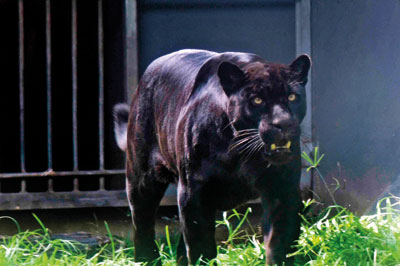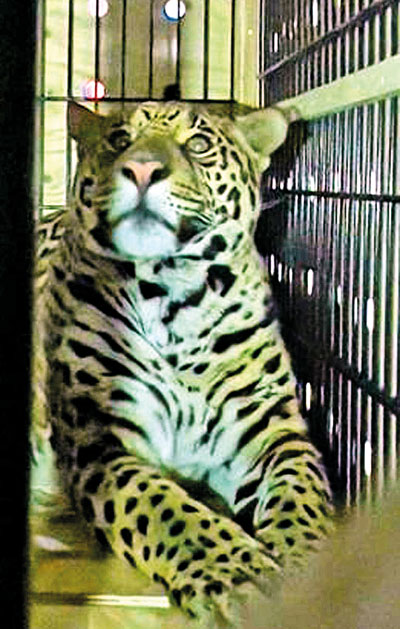News
Potential mate arrives for zoo’s resident female jaguar
View(s):
The new male (right) would be introduced to the resident melanistic female Jaguar Leya (left) Pix by Akila Jayawardana
By Kasun Warakapitiya
A two-year-old male jaguar brought to Sri Lanka from the Netherlands is now in quarantine while it gets used to the conditions at the National Zoo at Dehiwala.
Jaguars (Panthera onca), which are considered to be the third largest cat species in the world, are found in the western United States across Mexico and in Central America. They are also found in Amazon rainforests.
They inhabit a variety of forests and open areas, but prefer tropical and subtropical forests and wetlands.
National Zoological Gardens Director General Thilak Premakantha said the big cat came from the “best zoo” situated at North Brabant, the Netherlands under an animal exchange programme.
Sri Lanka will send two pairs of grizzled giant squirrels to the Netherlands.
“Zoos do not sell their animals, but exchange animals to obtain species that are absent in their zoos. This is followed by the world association of zoos and aquariums,’’ he said.

Tilak Premakantha
Mr Premakantha said the programme is also used to stop inbreeding of animals, and maintain genetic diversity. “Every zoo maintains a surplus list of animals. In our case, we had an excess of giant squirrels.’’
Senior officials of the Dehiwala Zoo said the new male would be gradually introduced to the resident melanistic female Jaguar “Leya”.
The Sunday Times noticed that the jaguar is being quarantined in the shed where the zoo’s oldest elephant Bandula, which died last year, was held. The site is covered with a thick canvas and the area is cordoned off.
The zoo’s Animal Health and Nutrition Director Dr Chandana Rajapaksa said the animal would be subjected to quarantine.
The zoo had asked the Netherlands Zoo to carry out a PCR test on the animal, he said.
The jaguar will be fed with three kilos of meat (chicken) daily. However, as jaguars in the wild do not feed every day, at least once a week, the animal will not be fed.

Tilak Premakantha
Dr Rajapaksa said two zookeepers in special clothing will handle the animal. Even its faeces and food waste will be disposed of separately.
Veterinary surgeons at the zoo have been advised to check the animal first in the mornings and then disinfect themselves before tending to other animals.
Zoo authorities also added that measures are being taken to help the animal acclimatise to the Sri Lankan climate. Ice blocks are being used.
“We are gradually reducing the size of the ice blocks within the 30 days and then slowly introducing the new jaguar to our resident female jaguar’s enclosure,’’ he said.

The best way to say that you found the home of your dreams is by finding it on Hitad.lk. We have listings for apartments for sale or rent in Sri Lanka, no matter what locale you're looking for! Whether you live in Colombo, Galle, Kandy, Matara, Jaffna and more - we've got them all!

